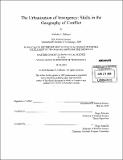The urbanization of insurgency : shifts in the geography of conflict
Author(s)
Calluzzo, Nicholas T
DownloadFull printable version (7.189Mb)
Alternative title
Sifts in the geography of conflict
Other Contributors
Massachusetts Institute of Technology. Dept. of Political Science.
Advisor
Roger Petersen.
Terms of use
Metadata
Show full item recordAbstract
The 20th century witnessed the steady decline of the ability of states, particularly great powers, to defeat insurgencies. During the same period, the world has become both more populous and more urban. As people have taken to the cities, so too have insurgents increasingly made battlefields out of urban areas. This study has sought to determine the impact of urbanization on insurgency outcomes using a post-war dataset of insurgencies. It has predicted that urbanized insurgencies favor the insurgent by facilitating concealment and cover, nullifying the relatively power differential enjoyed by states, and providing them with an abundance of soft targets useful for undermining the counterinsurgent's legitimacy. Although constrained by a number of data limitations, the results demonstrated that more urbanized insurgencies were a significant challenge to counter insurgents. By partitioning the dataset by insurgency type, the study was able to determine unique predictors of conflict outcome for each type. Urbanized insurgencies are particularly hard to defeat when the counterinsurgent is a foreign occupier, more democratic, and the insurgency has external support. Rural insurgencies become more difficult to defeat the more linguistically diverse the population. Furthermore, by increasing the number of conflict casualties, rural insurgents can particularly benefit from rough terrain.
Description
Thesis (S.M.)--Massachusetts Institute of Technology, Dept. of Political Science, 2010. Cataloged from PDF version of thesis. Includes bibliographical references (p. 73-74).
Date issued
2010Department
Massachusetts Institute of Technology. Department of Political SciencePublisher
Massachusetts Institute of Technology
Keywords
Political Science.